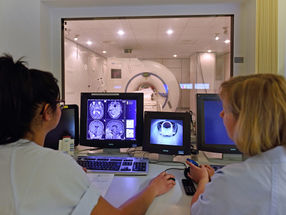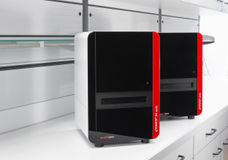Gene Lab To Go
Reasonably priced and battery-driven: a pocket PCR device
Advertisement
A huge number of diagnostic techniques are based on PCR (the polymerase chain reaction): the use of PCR allows even the tiniest amounts of genetic material to be duplicated so that it can be analyzed. This should make things such as the rapid and reliable identification of a dangerous infectious agent possible. Researchers at Texas University have now developed a prototype of a battery-driven pocket PCR device, which they have now introduced in the journal Angewandte Chemie. Simple in its construction and handling, this unconventional thermocycler can be produced for about ten US dollars - ideal for applications in areas lacking infrastructure.
PCR involves three steps that must be repeated again and again until enough copies of the genetic material have been produced. The problem is that each of the three steps takes place at a different temperature (95, about 50, and 72 °C). In order to automate these temperature changes, the thermocycler was invented. This device heats, cools, and then reheats a reaction mixture at predetermined intervals, over and over again. This is time-consuming and takes a lot of electrical power. The team headed by Victor M. Ugaz has found an amazingly simple trick to avoid all this burdensome heating and cooling. Instead of bringing the temperature to the reaction mixture, they bring the reaction mixture to the temperature. In a closed circuit, the reaction solution continuously flows through three zones, each held at one of the three required temperatures.
Moreover, the solution doesn't even have to be pumped around the circuit; it circulates on its own. The driving force for this is the phenomenon called convection. Differences in the density of the solution at different temperatures cause the fluid to begin circulating between the warm and cold areas in a closed circuit. At the heart of the prototype are three metal blocks, one of which is heated by resistance to 95 °C. Screws made of a different metal hold the blocks together. When properly laid out, this arrangement causes the two unheated blocks to automatically reach their desired temperatures. Two small batteries are thus enough to drive the pocket thermocyler. The reaction vessel consists of a narrow plastic tube that winds around the blocks. The diameter of the tube can be changed to control the volume of the reaction (usually in the microliter range) as needed.
Original publication: Victor M. Ugaz et al.; "A Pocket-Sized Convective PCR Thermocycler"; Angewandte Chemie International Edition 2007.
Other news from the department science
These products might interest you
Most read news
More news from our other portals
See the theme worlds for related content
Topic World PCR
This groundbreaking and highly versatile molecular technique of PCR allows us to amplify tiny amounts of genetic material on a large scale and analyze them in detail. Whether in medical diagnostics, forensic DNA analysis or research into genetic diseases - PCR is an indispensable tool that gives us deep insights into the world of DNA. Immerse yourself in the fascinating world of the polymerase chain reaction (PCR)!

Topic World PCR
This groundbreaking and highly versatile molecular technique of PCR allows us to amplify tiny amounts of genetic material on a large scale and analyze them in detail. Whether in medical diagnostics, forensic DNA analysis or research into genetic diseases - PCR is an indispensable tool that gives us deep insights into the world of DNA. Immerse yourself in the fascinating world of the polymerase chain reaction (PCR)!




























































